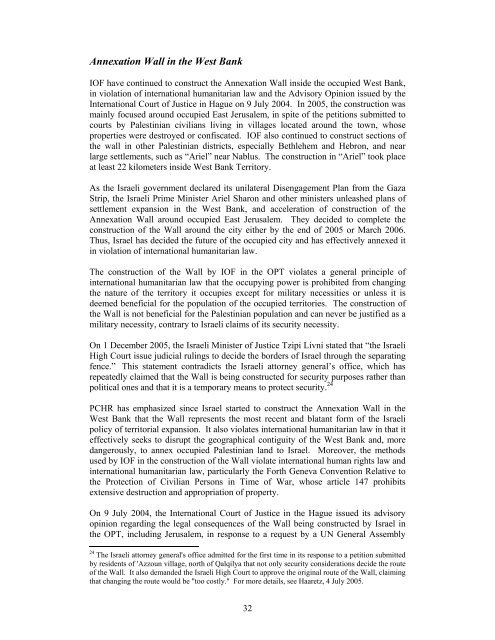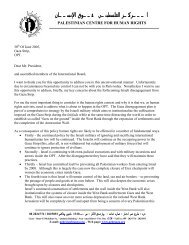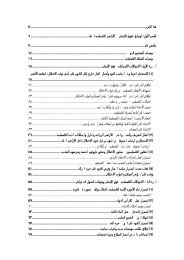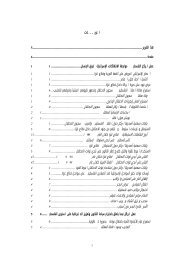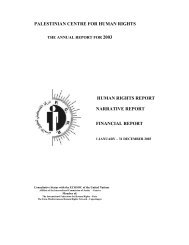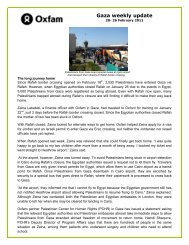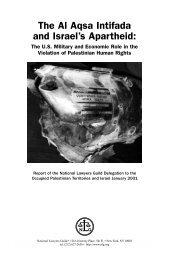Annual Report - Palestinian Center for Human Rights
Annual Report - Palestinian Center for Human Rights
Annual Report - Palestinian Center for Human Rights
You also want an ePaper? Increase the reach of your titles
YUMPU automatically turns print PDFs into web optimized ePapers that Google loves.
Annexation Wall in the West Bank<br />
IOF have continued to construct the Annexation Wall inside the occupied West Bank,<br />
in violation of international humanitarian law and the Advisory Opinion issued by the<br />
International Court of Justice in Hague on 9 July 2004. In 2005, the construction was<br />
mainly focused around occupied East Jerusalem, in spite of the petitions submitted to<br />
courts by <strong>Palestinian</strong> civilians living in villages located around the town, whose<br />
properties were destroyed or confiscated. IOF also continued to construct sections of<br />
the wall in other <strong>Palestinian</strong> districts, especially Bethlehem and Hebron, and near<br />
large settlements, such as “Ariel” near Nablus. The construction in “Ariel” took place<br />
at least 22 kilometers inside West Bank Territory.<br />
As the Israeli government declared its unilateral Disengagement Plan from the Gaza<br />
Strip, the Israeli Prime Minister Ariel Sharon and other ministers unleashed plans of<br />
settlement expansion in the West Bank, and acceleration of construction of the<br />
Annexation Wall around occupied East Jerusalem. They decided to complete the<br />
construction of the Wall around the city either by the end of 2005 or March 2006.<br />
Thus, Israel has decided the future of the occupied city and has effectively annexed it<br />
in violation of international humanitarian law.<br />
The construction of the Wall by IOF in the OPT violates a general principle of<br />
international humanitarian law that the occupying power is prohibited from changing<br />
the nature of the territory it occupies except <strong>for</strong> military necessities or unless it is<br />
deemed beneficial <strong>for</strong> the population of the occupied territories. The construction of<br />
the Wall is not beneficial <strong>for</strong> the <strong>Palestinian</strong> population and can never be justified as a<br />
military necessity, contrary to Israeli claims of its security necessity.<br />
On 1 December 2005, the Israeli Minister of Justice Tzipi Livni stated that “the Israeli<br />
High Court issue judicial rulings to decide the borders of Israel through the separating<br />
fence.” This statement contradicts the Israeli attorney general’s office, which has<br />
repeatedly claimed that the Wall is being constructed <strong>for</strong> security purposes rather than<br />
political ones and that it is a temporary means to protect security. 24<br />
PCHR has emphasized since Israel started to construct the Annexation Wall in the<br />
West Bank that the Wall represents the most recent and blatant <strong>for</strong>m of the Israeli<br />
policy of territorial expansion. It also violates international humanitarian law in that it<br />
effectively seeks to disrupt the geographical contiguity of the West Bank and, more<br />
dangerously, to annex occupied <strong>Palestinian</strong> land to Israel. Moreover, the methods<br />
used by IOF in the construction of the Wall violate international human rights law and<br />
international humanitarian law, particularly the Forth Geneva Convention Relative to<br />
the Protection of Civilian Persons in Time of War, whose article 147 prohibits<br />
extensive destruction and appropriation of property.<br />
On 9 July 2004, the International Court of Justice in the Hague issued its advisory<br />
opinion regarding the legal consequences of the Wall being constructed by Israel in<br />
the OPT, including Jerusalem, in response to a request by a UN General Assembly<br />
24 The Israeli attorney general's office admitted <strong>for</strong> the first time in its response to a petition submitted<br />
by residents of 'Azzoun village, north of Qalqilya that not only security considerations decide the route<br />
of the Wall. It also demanded the Israeli High Court to approve the original route of the Wall, claiming<br />
that changing the route would be "too costly." For more details, see Haaretz, 4 July 2005.<br />
32


